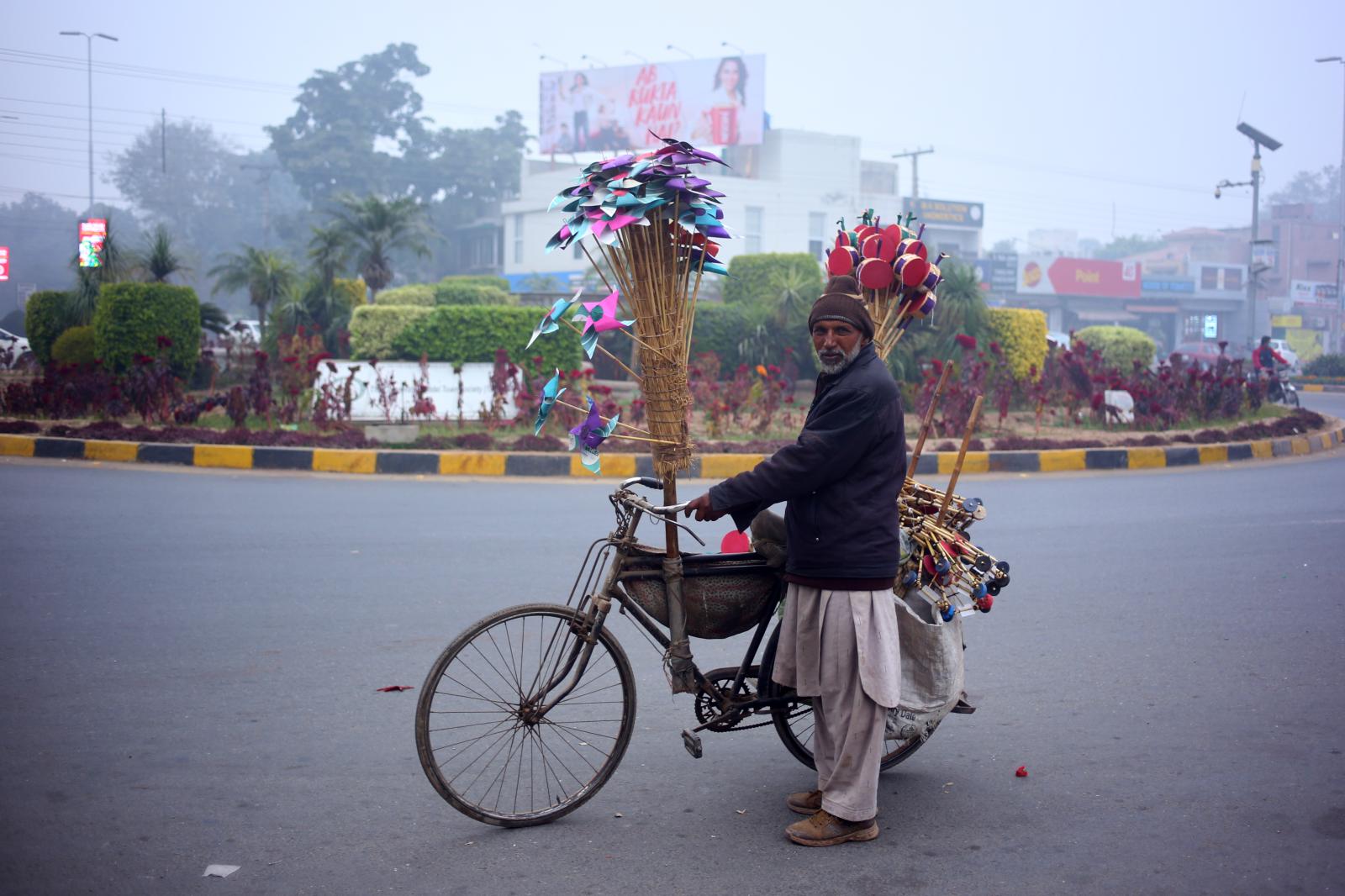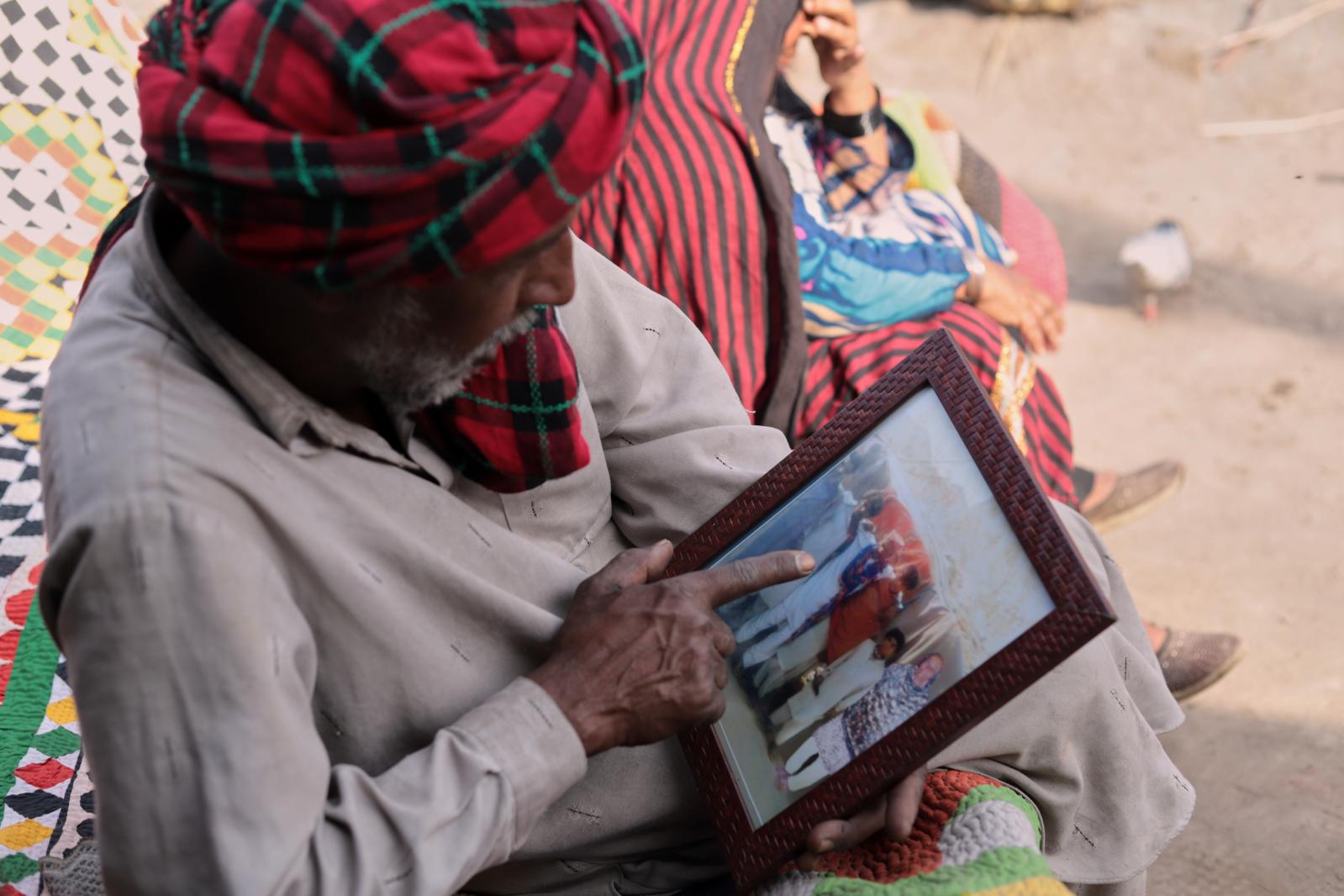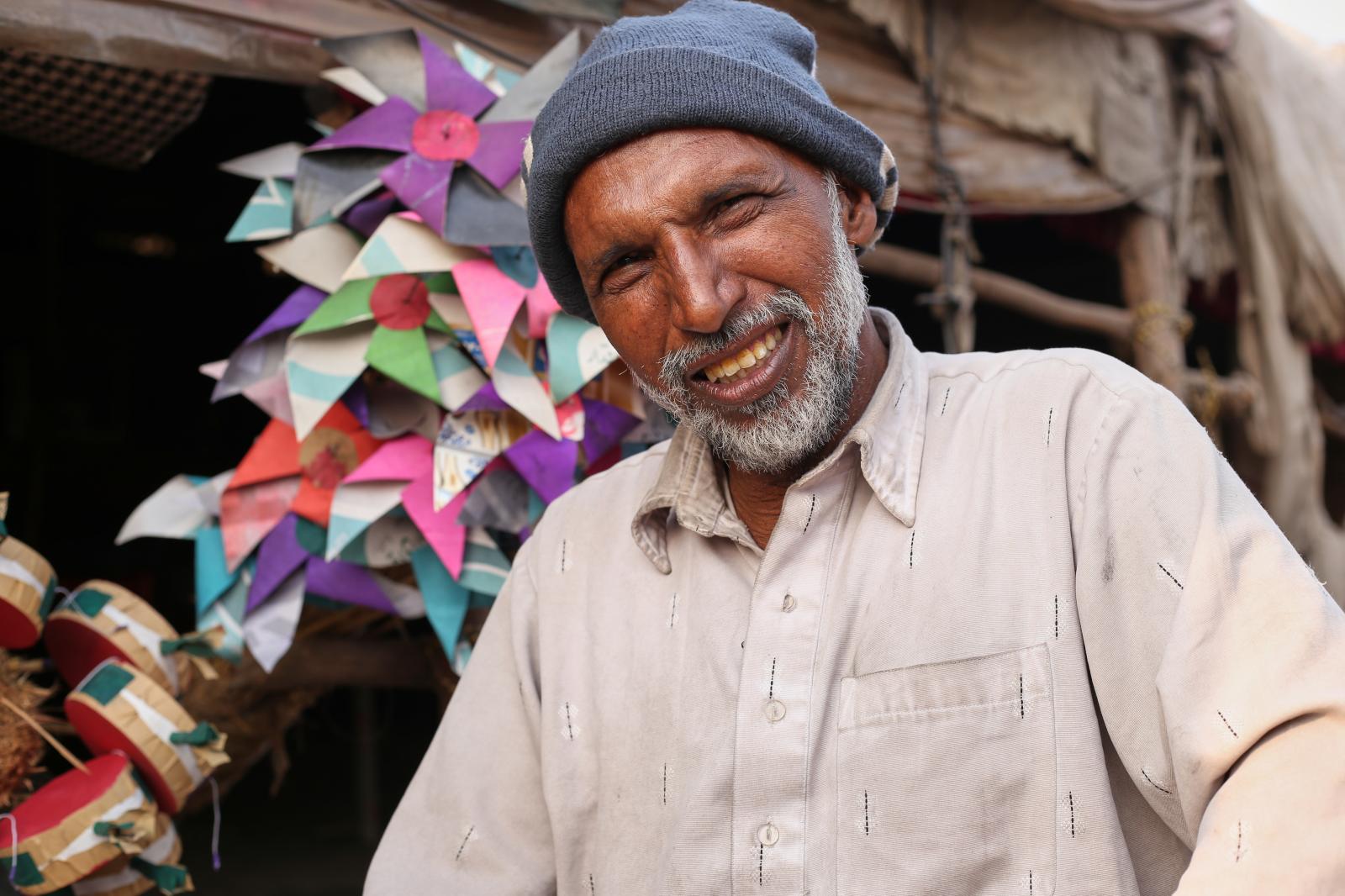1. Ameer Khan (Householder)
2. Khatoon Bibi (Wife of Ameer)
3. Sakhi Muhammad (Younger brother of Ameer)

Ameer Khan has been making these toys for the last 35 years upon his move to Lahore from a village, Banjar, which comes under Tehsil Talagang offshoots of Pothohar.


“I leave at 7/8 am in the morning from Babu Sabu and go to Model Town, Green Town, Muslim Town Mian Plaza, Karim Market, Johar Town, Ichara Bazar, Mozang, Gulberg and sometimes Shoe Market, we are not allowed to enter DHA. The guards don't let us enter because, we are poor people, and the bicycles we carry are also second-rated; sometimes its chain derails, and sometimes I start dripping due to sweat", He said smiling. “It takes an hour and a half to reach any market by bicycle ride.”
Ameer Khan told about his childhood, "When I was a child, I used to play Gulli Danda, and Kenchy. He held his finger with the other hand to demonstrate, or we used to play with walnuts; I remember we used to make a toy called Khandoori, a ball made of leftover clothes; Ameer Khan told me the process of making Khandoori. We used to collect old useless clothes, soak them in water and tie it firmly. His hands were moving like he was making one when it became the size of a small ball, then we used to stitch it with needle and thread and later played with it just like cricket, but we had clubs instead of bats. We used to play all day before shifting to Lahore."
“We just demand that these toys have a single set cost, and whoever wants to buy one item should ask for one and pay us. We don't need to bargain – a price should be set, no matter whether the buyer comes on a car, motorcycle, or anybody. The buyer should appreciate our hard work and craft. This is all we desire!”
"After me, I don't know if my children will carry on this craft or not. We cannot compel them. As long as I am alive, I will keep making them because of wages, and we are thankful to the Malik, who feeds us. I cannot claim that my grandsons will carry this (craft) forward; I am not sure. Danish Ali (Ameer's grandson) sits with me while I make these toys. They observe us while we make them. Munir (Ameer’s youngest son) does what his heart says, sometimes, he helps me make toys, and sometimes he does not; he learnt the craft and then makes the toys but does not like to sell like me."
Once their only daughter, Shazia was visiting so Ameer Khan already shared the date of her arrival, he also wanted to have a family photograph. I observed that they have strange relationship while being photographed, in this age of a click with every second, being photographed is an event for them, a special one in fact.
Bholi and Munir got married 6 months ago and their cousin took their pictures on a mobile phone, but they did not own any as a Yadgeeri. So, Bholi wore her bridal dress, applied make-up for recreating the memory of her Wedding Day.
Munir is very fond of pets. He has hens, pigeons and a quail.
Munir does not like to sell these toys but he helps his preparing sometimes when he has free time.
It was a cold, cloudy evening in the beginning of January 2021. I was sitting on a cot outside of Ameer Khan's tent-house when I saw a person of six feet coming towards me hobbling. He was, in his sixties, wearing a chocolate brown shalwar kameez, covering the head with a brown pakol, keeping a thick and lengthy mustache, eyes were brimming with Surma and he was wearing a brown Gargaabi in feet. For a moment, I thought some retired security guard was coming; later, Khatoon Bibi told me he was the younger brother of Meeru (Ameer Khan is called Meeru by love).
One day Sakhi Muhammad invited me to his tent-house for the first time. It was a 20 x 16 tent house with a small kitchen made of mud. While entering the tent-house, two wooden charpais were lying left and right, leaving the space in the center that ends with large trunks covered by colorful frills. Some posters of Sufis (Shahbaz Qalandar, Data Sahib) were hanging along the roof in the center of the tent-house.
He showed me pictures of all his four wives. He wanted to get one of his pictures photoshopped with one of his wives, who died some years ago. He told me he has 5 children from his last wife, who lives back in Talagang with his children, and a daughter from another wife. He shared that two of his wives died, whereas one he divorced.
I could see sadness coming over his eyes while sharing pictures of his deceased former wives. “I have pictures of all my family members, and I keep them as Yadgeeri; my children will have them after my death.”“I used to be dandy in my prime age, even once Lollywood people came and offered me to work with them in Punjabi movies, I was also interested and willing to go in showbiz, but my mother and my sister started crying if the people would misuse me, so I gave up.”
Sakhi Muhammad's elder son, Rehmat sells coloured fish on the streets. He prefers selling fish to making and selling these toys he thinks the toys don’t pay enough…
I found an interesting thing about the toymakers’ relationship with pictures. Surprisingly, they had only one source of being photographed themselves: the Pathan photographers on the streets. I observed that whenever they view their family pictures, they become sad. Sakhi Muhammad again stressed that pictures are Yadgeeri for everyone as when he will die, these would be Yadgeeri for them, and when they would not be any more, they would go with his grandsons, so it will go generation to generation."
"If I talk about my father's time at that time this skill of earthen pot making was time taking as there weren't electric motors so he used foot to revolve the plate on that pot was made. Now the force that was made by foot has been replaced by electric motor. The pots have also been modernized as per the requirement as pitcher has been replaced by earthen jug, and bowl has taken place of earthen glass now. We have made tea sets and water sets of mud as well. I was trained on that manual machine initially but now I have converted to this motor based machine and that manual machine used to take a lot of energy and effort and this craft doesnt pay us in return according to the amount of hardwork we put in. By using these earthen toys you cannot fall a prey to any disease."
" I was fond of this craft and I want to promote this craft for my country and make Pakistan proud. I made world's smallest pot by this skill that is the size of pinky finger's nail. I want to show the world our talent. I also conduct workshops in schools and festivals because I want to promote this craft and glad to teach anyone especially new generation."
